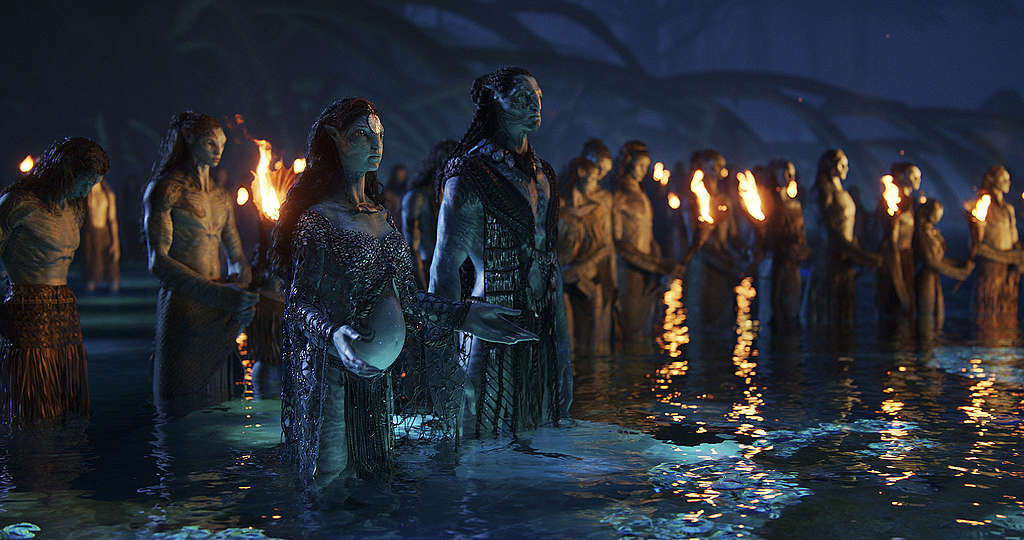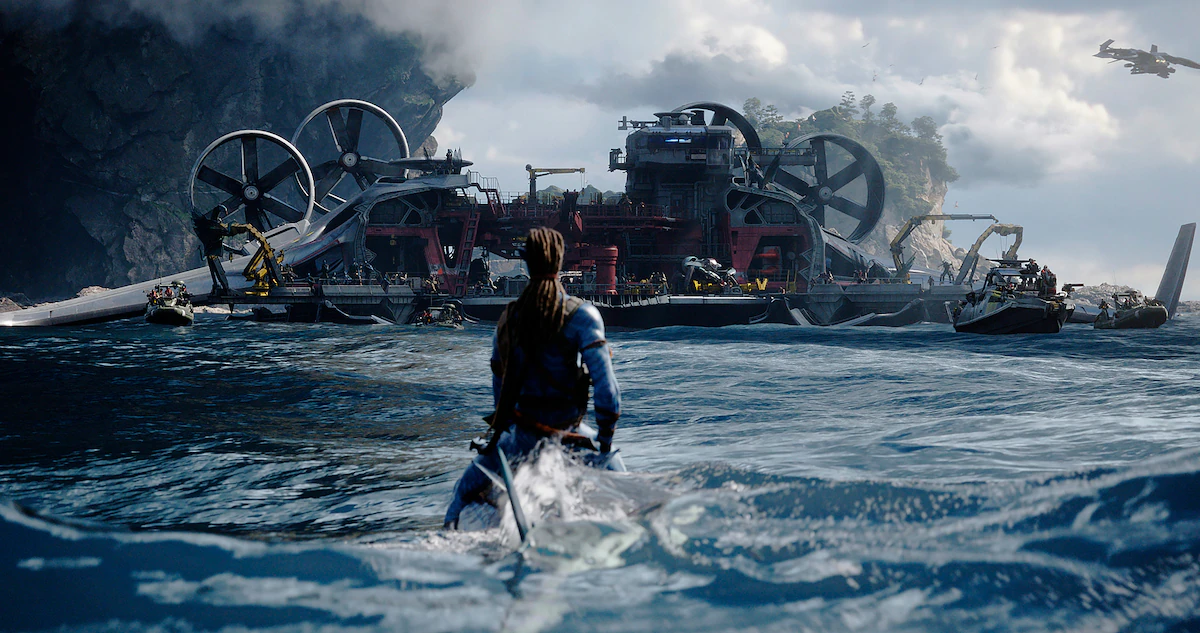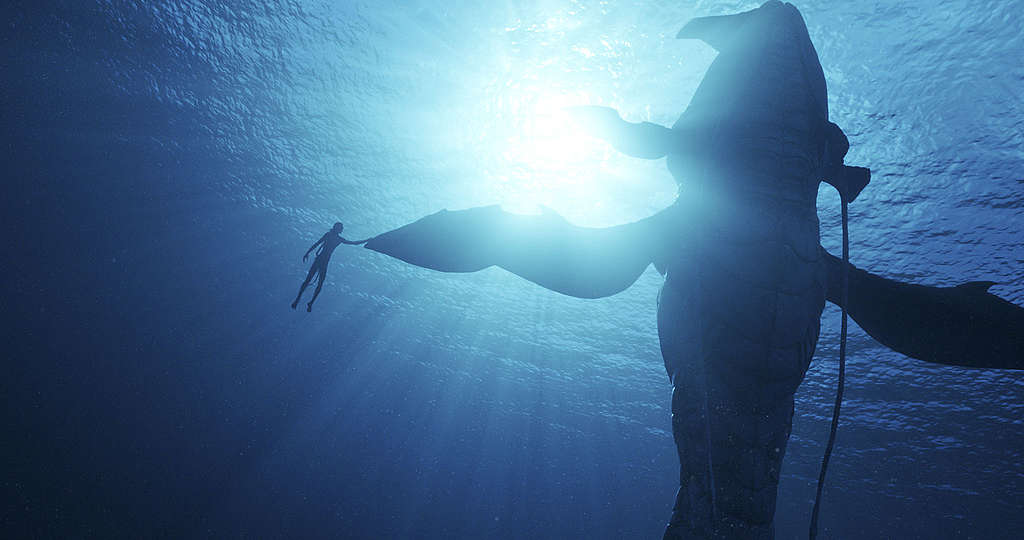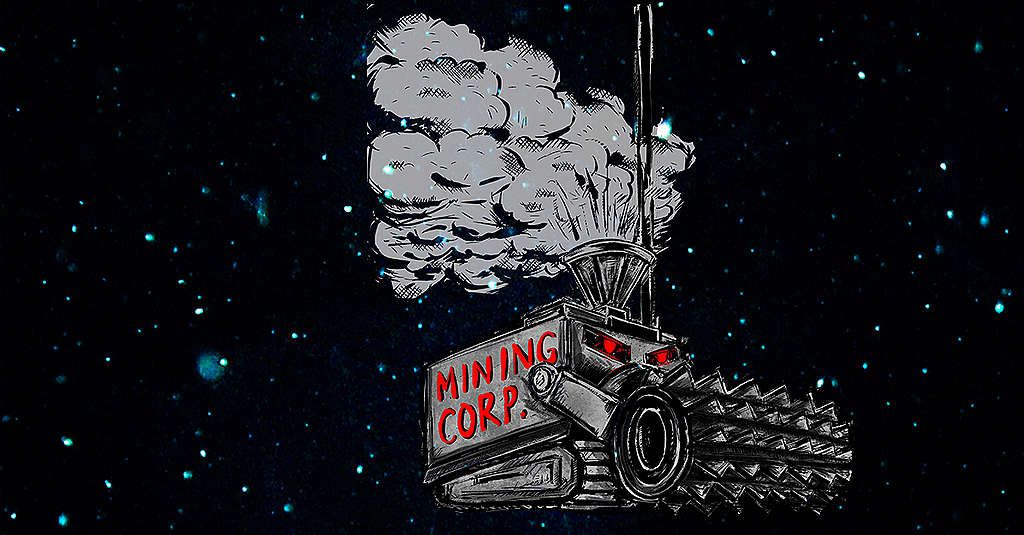Avatar: The Way of Water directed by James Cameron, is currently showing in cinemas across the world. Zane Wedding and James Hita of Greenpeace Aotearoa went along to a recent screening in Auckland and got to thinking about the message behind Avatar. This piece is a collection of our thoughts and opinions on how the movie intersects with the campaign to protect the oceans from deep sea mining. It goes without saying, but we’ll say it anyway – spoilers ahead.
Avatar 2 – The Way of Water
Like the first Avatar, Avatar 2 is set in the fictional world of Pandora and follows its inhabitants – the Na`vi, who are deeply connected to the natural world. This time we’re introduced to a new “clan” called the “Metkayina”, who live in and around the ocean instead of the forest.
Sitting in the movie theatre watching this, we saw deep-rooted parallels in the film between extractive industries like logging and land-based mining in the Pacific historically, with the new threat on the horizon of deep sea mining.
Cultural appropriation of Māori and other indigenous cultures in Avatar
Firstly it was clear to us as people of Māori descent, that core elements of the movie walk a fine line between art and full-blown cultural appropriation. This includes elements in Avatar such as water being around characters from before birth to after death, it being the source of life – to facial tattoos or moko kanohi in our own culture, breathing techniques to dive deeper underwater, and whale-like sea animals being spiritual brothers and sisters. These are all centred in indigenous ideas and experiences. As understood by director Cameron – a white man – who has done only surface level research. This shows we still see colonial superiority underpinning all of these elements, instead of representation true to indigenous communities.

The whole Avatar movie franchise is based on the issues of extractivism, colonialism, and breaking stereotypes, but to us it seems Cameron fails to realise that in creating these stories he has extracted aspects of indigenous cultures to make a profit. Seemingly without proper consultation or recognition of the communities whose stories he has stolen.
Earth is dying and Pandora is the new frontier for colonisation
One of the dangers in the current model of human extractivism is the idea that there are always fresh resources to exploit. In Avatar: the way of water this means a whole new planet. As the movie starts we see the “General” tell the new arrivals that they are no longer on Pandora to run a mine, that Earth is dying, and their task is to ‘tame’ the planet for humans. This includes needing to “pacify the hostiles” by burning villages, killing indigenous people, and destroying families.

History of extractives in the Pacific
This made us think about the historical and current battle in the Pacific region with indigenous peoples across te Moananui-a-Kiwa – the Pacific, opposing extractive industries. Historically it was against industries such as logging, land-based mining, and whaling with foreign influences flying in to quell uprisings with fire and bloodshed.
The real-world equivalent of the new frontier is this false narrative that deep sea mining will support the green energy transition. An excuse for destruction of the deep seabed in the name of profit.
A core part of the story of this film is the insertion of “sky peoples” memories into Avatars in order to be more likely to be seen as “indigenous”. This is the literal insertion of colonial thinking into an indigenous body.
Worst of all, just as the ‘sky people’ insert themselves in Na`vi lands as Avatars, foreign deep sea mining companies are inserting themselves into indigenous communities under the false pretence of providing locals with “opportunities”, whilst hiding the huge risk behind their dangerous activities.
How does Avatar relate to companies like The Metals Company that want to mine the deep sea?
We see this insertion of colonial thinking in the deep sea mining industry activities, such as how “The Metals Company” and its subsidiaries work. Tonga Offshore Mining Limited (TOML) for example provides locals with scholarships, a community assistance program, and a disaster assistance program. None of which have anything to do with deep sea mining, and rather are designed to literally insert themselves into the psyche of locals in a positive light. All to blind locals to the destruction of the deep sea ecosystems that are key to the Pacific way of life.
Deep sea mining destroys ecosystems on the seabed and releases carbon into the ocean which is one of our biggest allies against the climate crisis. Every breath you take on Earth is half thanks to the ngāhere – the forest, and half thanks to te moana – the ocean and the life that exists within it.
Research and industry links
New Zealand actor/comedian Jemaine Clement makes an appearance in Avatar: The Way of Water as a marine biologist working on a ship that hunts the spiritual siblings of the Metkayina, the tulkun. These are highly intelligent and sentient 300 ft sea creatures that most closely resemble real-world whales. The hunters, or poachers, hunt the tulkun to harvest a small vial of liquid from their brains. Hugely profitable, this golden liquid is used for the preservation of human longevity, completely stopping the process of ageing. When reminded that his research is funded by the profit from these “hunts”, the marine biologist character played by Clement dryly says “that’s why I drink”.

When profit-motivated companies like The Metals Company conduct research about environmental and cultural impacts we should all be sceptical and on the lookout for greenwash. The Metals Company has recently completed a test mining run in The Pacific, and more mining companies are racing toward allowing large-scale mining of the deep sea before any independent research can be conducted.
All of this should ring alarm bells in your ears. Whaling in the waters of the Pacific was to extract oil to light the homes of colonisers, making a few of them extremely wealthy along the way. Now deep sea mining is on the horizon to do the same. With the decidedly sketchy Gerard Barron at the helm of The Metals Company, mining the deep sea can only come at the expense of the Pacific and its people. As The Wall Street Journal noted, Barron previously backed another deep sea mining company that “lost a half-billion dollars of investor money, got crosswise with a South Pacific government, destroyed sensitive seabed habitat and ultimately went broke”.
Nature can’t save itself – A call to action
Finally, I know one thing for sure: in our story here on Earth there is no miraculous space whale that will save us. We need to do it ourselves.
Here in the Pacific, indigenous people are once again threatened by an extractive industry seeking to exploit the world we are spiritually connected to. The new deep sea mining industry looms large on the horizon, and could do great harm to our way of life and to the natural world that sustains us. And as a species, we face the double edged crisis of climate and biodiversity breakdown.
We don’t have a tulkun to save us, but we have all of us working together to stand up and say no to extractive new industries that threaten our planet.
Take a moment now to sign this petition, calling for a ban on deep sea mining.

It’s time for New Zealand to take a stand. Join our call on the New Zealand government to back a global moratorium on seabed mining.
